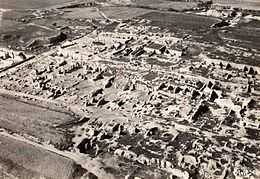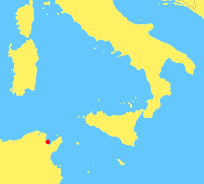Carthago delenda est



"Ceterum censeo Carthaginem esse delendam" or "Ceterum autem censeo Carthaginem esse delendam" (English: "Furthermore, (moreover) I consider that Carthage must be destroyed") often abbreviated to "Ceterum censeo", "Carthago delenda est", or "Delenda est Carthago"[1] (English: "Carthage must be destroyed") is a Latin oratorical phrase which was in popular use in the Roman Republic in the 2nd Century BC during the latter years of the Punic Wars against Carthage, by the party urging a foreign policy which sought to eliminate any further threat to the Roman Republic from its ancient rival Carthage, which had been defeated twice before and had a tendency after each defeat to rapidly rebuild its strength and engage in further warfare. It represented a policy of the extirpation of the enemies of Rome who engaged in aggression, and the rejection of the peace treaty as a means of ending conflict. The phrase was most famously uttered frequently by the Roman senator Cato the Elder (234–149 BC), as a part of his speeches.
Grammatical analysis
The phrase employs delendum, the gerundive of the verb deleo, "to destroy".[2] The gerundive (or future passive participle) delendus is a verbal adjective that may be translated as "to be destroyed". When combined with a form of the verb esse ("to be"), it adds an element of compulsion or necessity, yielding "is to be destroyed", or, as it is more commonly rendered "must be destroyed". The gerundive delendus functions as a predicative adjective in this construction,[3] which is known as a passive periphrastic. Carthago being a feminine noun, the feminine gender delenda of the gerundive is applied. The fuller forms Ceterum censeo Carthaginem esse delendam or Ceterum autem censeo Carthaginem esse delendam use the so-called accusative and infinitive for the indirect statement.
Historical background
Although the Romans were successful in the first two Punic Wars, as they vied for dominance with the seafaring Phoenician city-state of Carthage in North Africa (modern day Tunisia), they suffered a number of humiliations and damaging reverses in the course of these engagements, especially at the Battle of Cannae (216 BC). This grew into an attitude of seeking vengeance and total victory, which was expressed by these phrases. The city of Carthage was indeed finally razed by the Roman general Scipio Aemilianus after the Third Battle of Carthage in 146 BC, and its entire remaining population was sold into slavery. It thus never again posed a threat to Rome.[4] The modern legend that the city was sown with salt reflects the perceived savagery of its destruction.
Historical literary sources
Although no ancient source gives the phrase exactly as it is usually quoted in modern times (either Carthago delenda est or the fuller Ceterum censeo Carthaginem esse delendam), according to several ancient sources the Roman statesman Cato the Elder frequently if not invariably ended his speeches in the Senate with a variant of this expression even when his speech had been totally unrelated to Roman foreign policy towards Carthage.[5] The main ancient sources, are:
- Plutarch, biography of Cato in his "Parallel Lives", written in Greek, who quoted Cato's expression as "δοκεῖ δέ μοι καὶ Καρχηδόνα μὴ εἶναι."[6]
- Pliny the Elder, in his "Natural History", 15.23: "[Cato] clamaret omni senatu Carthaginem delendam."
- Aurelius Victor in his De Viris Illustribus, 47.8.: "Carthaginem delendam censuit."
- Livy, Ab Urbe Condita, XLIX.
- Florus, Epitoma de Tito Livio bellorum omnium annorum DCC, Liber primus, XXXI.[7] "Cato inexpiabili odio delendam esse Carthaginem... pronunciabat."
The evolution of the phrasing towards its modern forms has been considered by Silvia Thürlemann, in her article Ceterum censeo Carthaginem esse delendam in the journal Gymnasium 81 (1974).
Modern usage
A common modern use in order to emphasise to third parties the strength of one's opinion about a perceived necessary course of action is to add either at the beginning or the end of a statement the two opening words "Ceterum censeo..."
The phrase is sometimes fully adapted in modern usage, as a learned reference to total warfare.[8] In 1673 the English minister Anthony Ashley Cooper, 1st Earl of Shaftesbury revived the phrase in the form "Delenda est Carthago" in a famous speech before Parliament during the Third Anglo-Dutch War, comparing England to Rome and the Dutch Republic to Carthage. The pro-German radio station Radio Paris in occupied France between 1940 and 1944 had "England, like Carthage, shall be destroyed!" as its slogan. Ben Klassen, the founder of the anti-Semitic Church of the Creator, adopted the phrase for his movement, modifying it to Delenda est Judaica, "Judaism must be destroyed".[9] The phrase was used as the title for Alan Wilkins' 2007 play on the Third Punic War.[10]
In Isaac Asimov's novel Robots and Empire, Dr. Mandamus uses a note with the phrase in order to convince Kelden Amadiro to see him about his plan of destroying Earth, which they both consider the ultimate enemy of the Spacer worlds. In this case, the phrase is written as "Ceterum censeo, delenda est Carthago" and Mandamus translates it as "In my opinion, Carthage must be destroyed".
References
- ↑ The word order "Delenda est Carthago" is more elegant for oratorical purposes
- ↑ Cassell's Latin Dictionary, ed. Marchant & Charles. Deleo is actually "I destroy"; by convention, the present tense first person singular is used to identify Latin verbs where the infinitive is used in English
- ↑ Betts, Gavin, Teach Yourself Latin, Sevenoaks, 1992, p.125, ISBN 978-0340867037
- ↑ Lempriere's Classical Dictionary, ISBN 978-0946495122, 1984, Bracken Books
- ↑ Charles E. Little, "The Authenticity and Form of Cato's Saying 'Carthago Delenda Est,'" Classical Journal 29 (1934), pp. 429-435.
- ↑ "Plutarch • Life of Cato the Elder". Penelope.uchicago.edu. Retrieved 2015-04-30.
- ↑ "Florus: Epitome of Roman Wars". Thelatinlibrary.com. Retrieved 2015-04-30.
- ↑
- ↑ G. Michael (2009), Theology of Hate: A History of the World Church of Creation (University of Florida Press) p. 26.
- ↑ "Traverse THeatre : Homepage". Traberse.co.uk. Retrieved 2015-04-30.